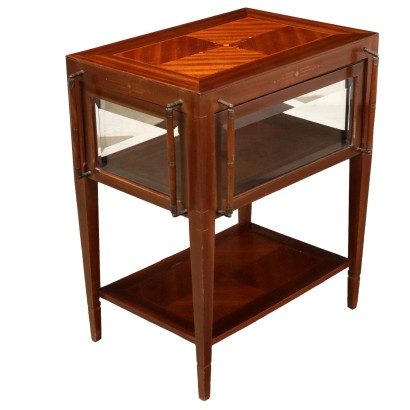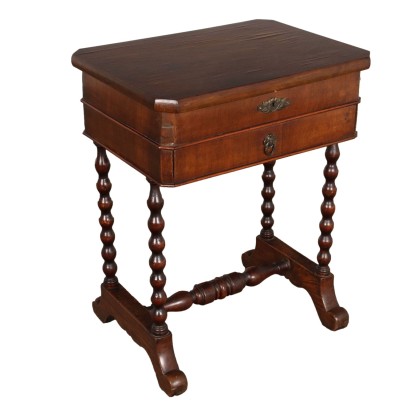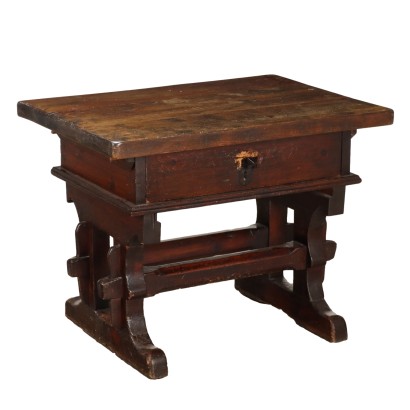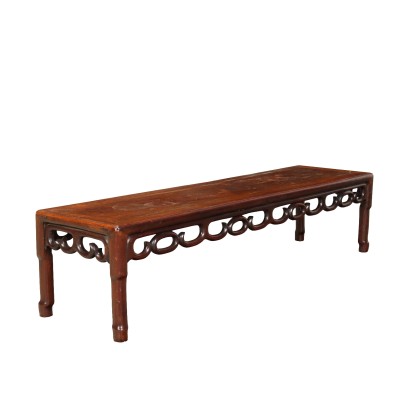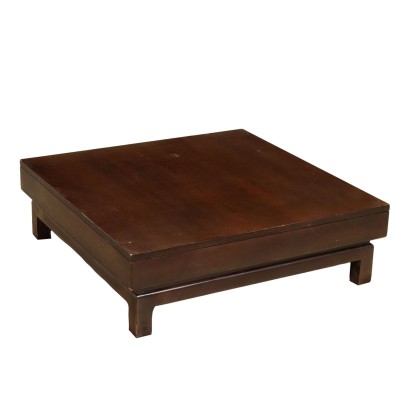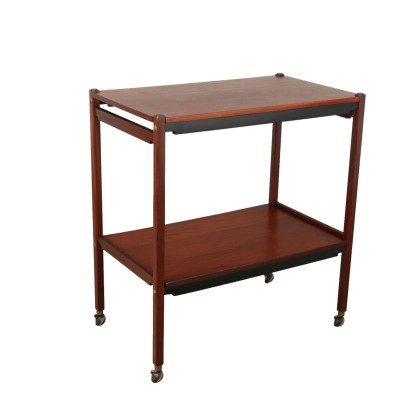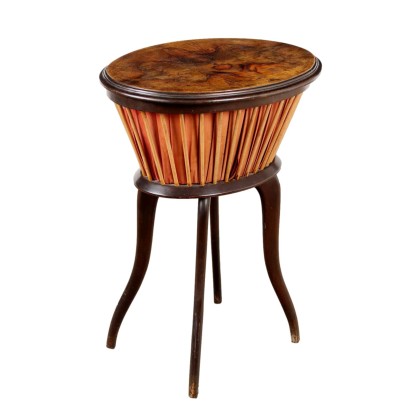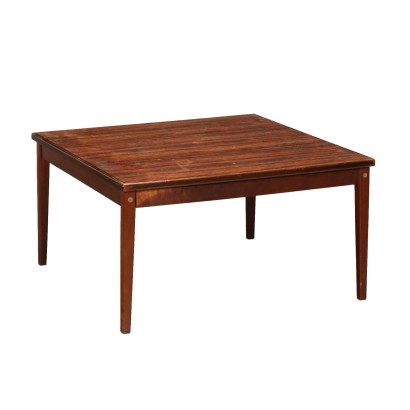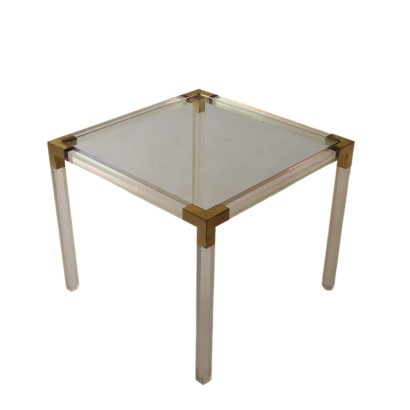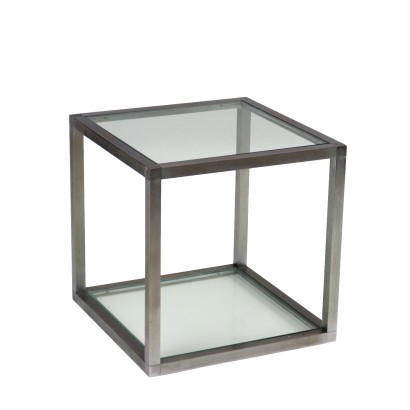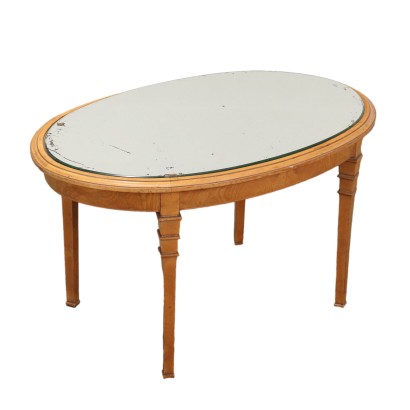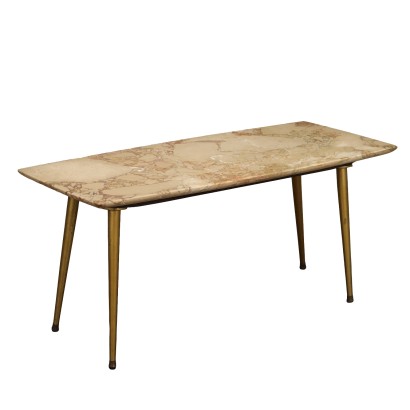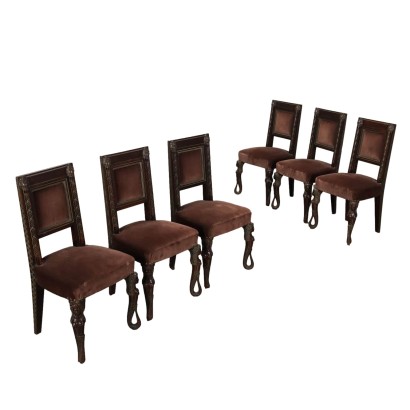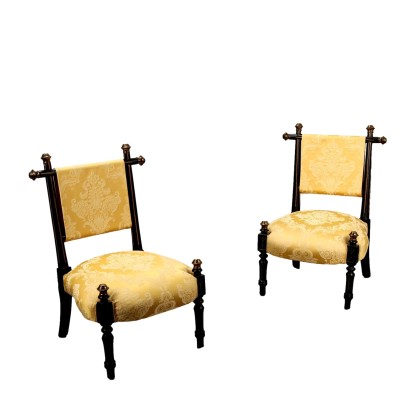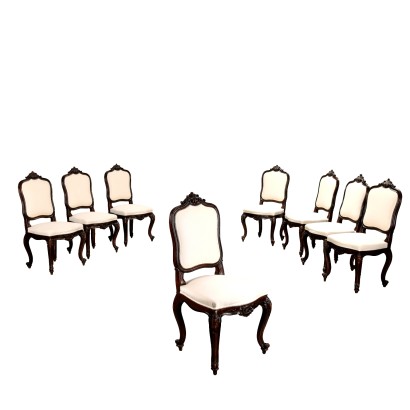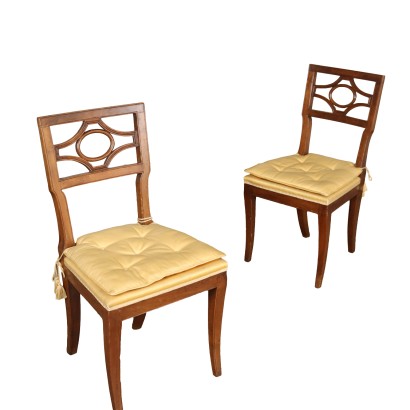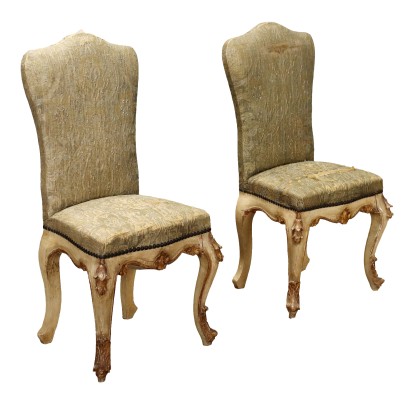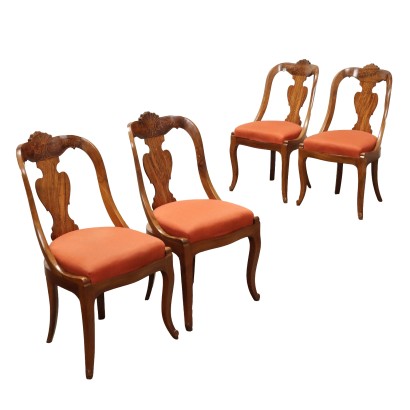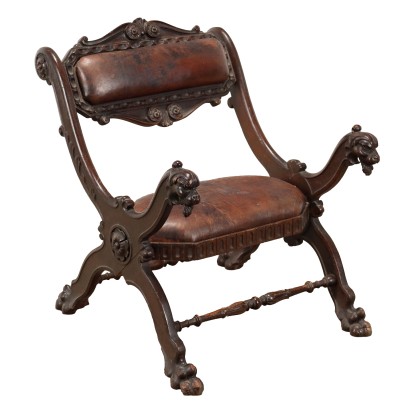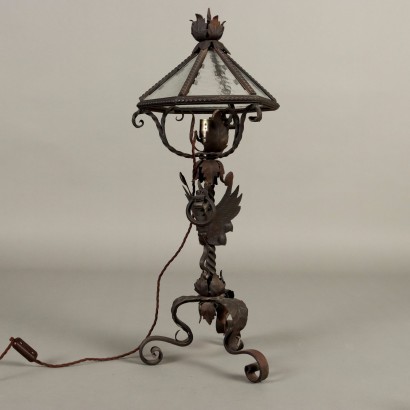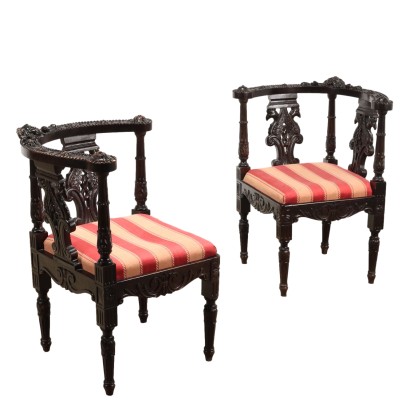Antique Art Nouveau Side Table Maple Mahogany XIX-XX Century - Italy, Late XIX - Early XX Century
Features
Italy, Late XIX - Early XX Century
Style: Art Nouveau (1890-1920)
Age: 19th Century / 1801 - 1900 , 20th Century / 1901 - 2000
Origin: Italy
Main essence: Maple , Mahogany
Material: Mahogany Veneer , Inlaid Wood , Dark Wood , Cut Glass
Description
Art Nouveau service table in mahogany veneer, Italy, late 19th - early 20th century. Decorated with geometric maple inlays and threaded in dark wood. On each side it has a cut glass door equipped with handles, which, once opened, constitutes an additional support surface.
Product Condition:
Product which due to age and wear requires restoration and re-polishing. We try to present the real state of the furniture as completely as possible with photos. If some details are not clear from the photos, what is stated in the description applies.
Dimensions (cm):
Height: 74
Width: 54
Depth: 69
Maximum size (cm):
Depth: 89
Additional Information
Style: Art Nouveau (1890-1920)
Historical stylistic period formed from the end of the 19th century (ca. 1890) after the Umbertino style and continued until the First World War.The current was characterized by the floral influence and the soft and curved lines, typical example are the "whiplashes".
The first signs of this new era came from architects such as Hector Guimard (1867-1942) who created numerous buildings and hotels, but also from people such as Arthur Mackmurdo furniture designer and Arthur Liberty industrialist and London merchant of the late 19th century who began to produce furnishing fabrics with floral motifs with soft and sinuous shapes.
The Universal Exhibition of Paris in 1900 was an important point for the development and affirmation of Liberty in the following decade.
Liberty was called in different ways depending on the nation, universally known as Art-Nouveau and it is thought that Arthur Liberty is the origin of the name given in Italy to this beautiful stylistic movement.
The name Art-Nouveau is thought to derive from a shop located in Paris called Maison de l'Art Nouveau which began to show off furniture with a new and innovative design in its windows.
With the end of the First World War, the naturalistic period of Liberty ended and the Art-Decò style appeared, with more rigid and geometric lines.
Find out more about the Liberty style with our insights:
Art Nouveau: birth and development of a style
Milan Liberty between flowers and colors
Carlo Zen's Liberty
Decorative shapes and elegance in an Liberty living room
FineArt: Aeolus and Cupid, Liberty sculpture by Luca Madrassi
FineArt: Nymph and Faun, Liberty sculpture by Giuseppe Siccardi
The Austrian taste of Baroque
Age:
19th Century / 1801 - 1900
19th Century / 1801 - 190020th Century / 1901 - 2000
20th Century / 1901 - 2000Main essence:
Maple
Hard, light wood used for inlays. It grows mainly in Austria, but it is widespread throughout the northern hemisphere, from Japan to North America, passing through China and Europe. It is one of the lightest woods ever, tending to white, it is similar to lime or birch wood. The briar is used in the production of ancient secretaires .Mahogany
It is one of the most precious and sought-after woods in cabinet making. It was discovered in Central America around 1600 and began to be imported to England in the 1700s. Much appreciated for its hardness and indestructibility, it became widespread following the blocking of walnut exports from France in 1720 and the consequent elimination of English import duties on mahogany from the colonies in America and India. The most valuable version comes from Cuba, but it became very expensive. At the end of the 18th century it began to be used also in France in Louis XVI, Directory and Empire furniture, its diffusion declined starting from when Napoleon, in 1810, forbade its import. It was generally used in the manufacture of elegant furniture, due to its characteristics and beautiful grain.Material:
Mahogany Veneer
Inlaid Wood
Dark Wood
Cut Glass
Other customers have searched:
Tavolini, tavolino antico..
Approfondimenti
Se ti interessano tavoli, tavolini, tavoli a vela, scrivanie, scrittoi e consolle dai un'occhiata ai nostri approfondimenti sul blog...
L'antiquariato dalla A alla Z: il Dizionario dell'Antiquariato
Il dizionario dell'antiquariato - Lastronatura
Il dizionario dell'antiquariato - Mascherone
Il dizionario dell'antiquariato - Natura morta
Il dizionario dell'antiquariato - Opificio
Il dizionario dell'antiquariato - Pastiglia
Il dizionario dell'antiquariato - Savonarola
Il dizionario dell'antiquariato - Rosone
Intaglio barocco con motivo a ricciolo
Sui tavoli:
Il Neobarocco in un grande tavolo dell'800
Il Tavolo a fratino
Sui tavolini:
Breve storia dei tavolini
Un tavolino impero lombardo: segno di egemonia politica
Il tavolino da gioco, questo sconosciuto
Il dizionario dell'antiquariato – tavolino a Commesso
...e alle presentazioni su FineArt
Tavoli antichi:
Tavolo campionario lapideo, Roma, Opificio Raffaelli
Tavolo a vela, attribuibile a Luigi e Angiolo Falcini
Tavolo attribuibile a Luigi e Angiolo Falcini
Gueridon, Regno delle Due Sicilie, primo quarto XIX secolo
Tavoli modernariato e design:
Archivio Borsani, patrimonio di memorie e saperi
Tavolo anni '40 ABV
Tavolo Mario Vender Anni '60
Tavolo anni '50 ABV
Tavolo '522' Gianfranco Frattini per Bernini
Tavolo 'Barium' Luciano Frigerio
Tavolo anni '50, Manifattura Italiana
Tavolini antichi:
Coppia di tavolini Tomaso Buzzi, attribuiti
Tavolino da gioco, Bottega Giuseppe Maggiolini, inizi XIX secolo
Tavolini modernariato:
Tavolino anni '50
Tavolino anni '40 ABV
Approfondimenti
Se ti interessano tavoli, tavolini, tavoli a vela, scrivanie, scrittoi e consolle dai un'occhiata ai nostri approfondimenti sul blog...L'antiquariato dalla A alla Z: il Dizionario dell'Antiquariato
Il dizionario dell'antiquariato - Lastronatura
Il dizionario dell'antiquariato - Mascherone
Il dizionario dell'antiquariato - Natura morta
Il dizionario dell'antiquariato - Opificio
Il dizionario dell'antiquariato - Pastiglia
Il dizionario dell'antiquariato - Savonarola
Il dizionario dell'antiquariato - Rosone
Intaglio barocco con motivo a ricciolo
Sui tavoli:
Il Neobarocco in un grande tavolo dell'800
Il Tavolo a fratino
Sui tavolini:
Breve storia dei tavolini
Un tavolino impero lombardo: segno di egemonia politica
Il tavolino da gioco, questo sconosciuto
Il dizionario dell'antiquariato – tavolino a Commesso
...e alle presentazioni su FineArt
Tavoli antichi:
Tavolo campionario lapideo, Roma, Opificio Raffaelli
Tavolo a vela, attribuibile a Luigi e Angiolo Falcini
Tavolo attribuibile a Luigi e Angiolo Falcini
Gueridon, Regno delle Due Sicilie, primo quarto XIX secolo
Tavoli modernariato e design:
Archivio Borsani, patrimonio di memorie e saperi
Tavolo anni '40 ABV
Tavolo Mario Vender Anni '60
Tavolo anni '50 ABV
Tavolo '522' Gianfranco Frattini per Bernini
Tavolo 'Barium' Luciano Frigerio
Tavolo anni '50, Manifattura Italiana
Tavolini antichi:
Coppia di tavolini Tomaso Buzzi, attribuiti
Tavolino da gioco, Bottega Giuseppe Maggiolini, inizi XIX secolo
Tavolini modernariato:
Tavolino anni '50
Tavolino anni '40 ABV

